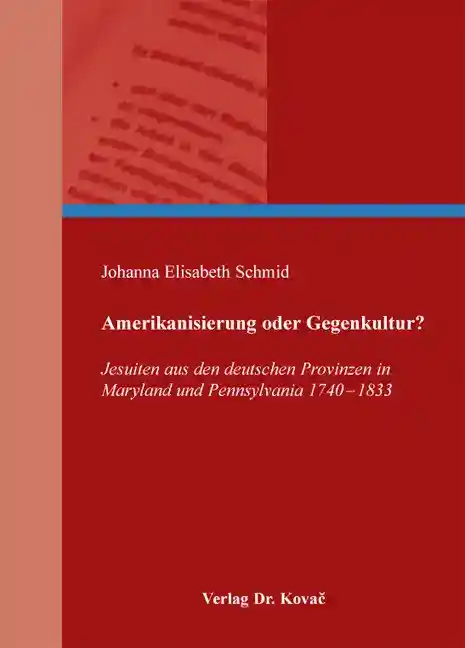Johanna Elisabeth SchmidAmerikanisierung oder Gegenkultur?
Jesuiten aus den deutschen Provinzen in Maryland und Pennsylvania 1740–1833
Studien zur Kirchengeschichte, volume 18
Hamburg 2013, 390 pages
ISBN 978-3-8300-7446-5 (print) |ISBN 978-3-339-07446-1 (eBook)
Rezension
Diese Publikation ist praktisch eine Geschichte der Jesuiten im Übergang von der britischen Kolonialzeit über den Unabhängigkeitskrieg zu den ersten Jahrzehnten der USA bis zur Errichtung der selbstständigen Ordensprovinz Maryland 1833, wobei die (insgesamt 16) deutschstämmigen Jesuiten noch einmal besonders berücksichtigt werden. [...]
About this book deutschenglish
From 1741 onward Jesuits from the German provinces became itinerant priests riding long hours and long distances in Pennsylvania and Maryland up to New York, New Jersey and Delaware. They started their travelling to the wide spread settlers from their plantations which had to be farmed to provide the Jesuits' subsistence. This made the Jesuits missionaries doubling as slave holders. After the suppression of the order in 1773 they were allowed to keep their property, because neither ecclesiastical nor secular authorities were interested in it. Seven German Jesuits and sixteen more from England or North America signed the charter of submission and went on with their work. After the American Independence had been declared Catholics were sure that their status would improve in this pluralistic society. But that was about to change. After the order had been recognized in White Russia six men who had grown up in German states joined the Jesuit community in the US within a period of five years: Many of them were sceptical about democracy and over-sensitive about their order's property. They felt challenged in a two-fold way: On the one hand American society began to comprise more and more denominations; so anti-Catholicism was a welcome unifying or integrating element. Thus the general idea was that Catholics could not be integrated into American society. On the other hand, with the growing structures of diocesan organization the bishops saw the order-to-be as a competitive institution. Nativism played an important role among the Jesuits. The gap between American-born Jesuits and those from Europe became bigger and bigger over the years. Mostly, the Europeans – and so the Germans – were said to lack a satisfying command of English, not to be able to cooperate with republican structures, and to prefer European, pre-revolutionary structures of power. The German Jesuits from the second generation focused on working at Georgetown College, they came into leading positions, but as they were never naturalized they were never able to have a say in financial matters. They were eager to prove the order's key competence: to render immigrants enlightened citizens taking their place in the American republican society, to educate the new elite in schools and publications, to shape Catholicism so that it actively contributed to the general welfare - although the Awakening movements and American nativism doubted that. Nevertheless, when it came to deciding how to go on with the plantations the German Jesuits were strongly in favour of concentrating on the cities, where the development towards an immigrant church had already started.Keywords
Geschichte der USAHabilitationJesuitenJesuitenschulenKatholische KircheKolonialzeitMarylandPennsylvaniaSklavenwirtschaftTrusteeismUSAIhr Werk im Verlag Dr. Kovač

Möchten Sie Ihre wissenschaftliche Arbeit publizieren? Erfahren Sie mehr über unsere günstigen Konditionen und unseren Service für Autorinnen und Autoren.
